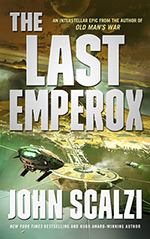
![]() SpaceAndSorcery
SpaceAndSorcery
4/10/2020
![]()
I received this novel from Tor Books, through NetGalley, in exchange for an honest review: my thanks to both of them for this opportunity.
A series' ending might probably be one of the most difficult tasks an author faces: readers' expectations, narrative twists and resolutions, characters' paths - it all must come together at the end, and I also imagine it might not be easy to let go of a world that one has so carefully built over time. Well, The Last Emperox turned out to be a very satisfactory ending to the Interdependency series, and did so by also being a compelling and fun read from the very start, where it offered a sort of recap of what went before by observing a character's thoughts as his ship comes under attack. Not only did this choice avoid any dangers of info-dumping, it also managed to turn into entertaining recollections what could very well have been the last, terrified considerations of an endangered individual. After all, this is a work from John Scalzi, and one must expect some playful rule-breaking...
So, the Interdependency is a galaxy-spanning civilization whose settlements are connected by the Flow, a system of wormhole-like paths that allow ships to cover vast distances in a relatively short time. The Flow has been in operation for centuries, but recently scientists have discovered that the whole system is going to collapse, therefore isolating these far-flung settlements and very likely dooming the inhabitants to death, since only one planet in the whole confederation is able to sustain life in an Earth-like environment and all the others are artificial habitats depending heavily on Flow-driven commerce. Such catastrophic news brings out the best and worst in humanity, as it's wont to do: some of the great merchant Houses try to speculate by amassing even more riches and power, others try to help in maintaining a level of civilization and the newly elected Emperox, Grayland II, finds herself dealing with a difficult situation, several attempts on her life and the conflicting agendas of various Houses.
Despite the light, playful tone, this series deals with several quite serious subjects, like the way people react when confronted with an imminent catastrophe - considering the moment in which I read this book, with humanity facing a worldwide crisis, I thought it was very spot-on and I was glad for the author's trademark lightness because observing the various fictional players it was impossible not to make disheartening comparisons with actual events. The series, and The Last Emperox in particular, shows how personal advantage is paramount for power-hungry individuals and how sowing distrust and misinformation helps drive their agendas, while the general population is divided between the few who plan in advance against a worst-case scenario and those lulled into the complacent belief that those in power will find a solution before the inevitable becomes a reality.
Where I found the second book in this series, The Consuming Fire, somewhat uneven in pacing due to the shift between the quicker-flowing sections and the long chunks of exposition dialogue, this final installment turned into a swift, riveting read as the antagonists' plots battled against the Emperox's and her allies' countermeasures, generating a constant race against time, fueled by shrewdness and political expediency that kept the story lively and the tension high. Most of this narrative tension rests on the three main characters: Grayland II, whose desire to be a good and just ruler needs to be balanced against the challenging decisions she must take in the face of the forthcoming Flow collapse; Nadashe Nohamapetan, the very embodiment of the evil lady, the dastardly plotter whose ambitions are surpassed only by her ruthlessness; and Kiva Lagos, the foul-mouthed, crafty ally of the Emperox who remains my favorite character and one of the best sources of humor in the whole series.
It's worth noting how these three women are not only at the very center of things, but also the most striking figures among the various personalities peopling this series: for example, if Nadashe is a vile adversary who stops at nothing to fulfill her goals, she ultimately does not come across as totally bad, if that makes any sense. As I saw her labyrinthine plans taking shape, I was torn between wanting them to fail and at the same time feeling sorry if they didn't: in a way I ended up envisioning her as poor Wile E. Coyote, who concocted equally convoluted and far-reaching plans to win over Road Runner, only to be always spectacularly defeated in the end - and that never failed to elicit some form of sympathy from me. On the other hand, there was no ambiguity in my cheering for Kiva's success, and although at some point she managed to set in motion a series of events whose serendipity might appear totally unbelievable, it all worked within the over-the-top setup of her character, making it easy to suspend my disbelief and equally easy to observe her antics with an amused smile. Grayland looks less intense in comparison with these two formidable figures, her apparent candor masking instead a firm determination and a core of integrity that seems to be sorely lacking in the Interdependency, and that's the main reason I was surprised - or rather stunned - at her unexpected choice for solving the quandary and giving her subjects a new direction and a hope for the future. I must say I did not expect the direction the story took and that in this instance the author managed to drop a very unpredictable twist on me here.
Where The Last Emperox draws all the narrative threads of the series to a good close, I find myself sorry to have to leave this universe, and I hope that John Scalzi might decide in the future to return here, maybe to show us how the former Interdependency fares in a post-collapse of the Flow future.
http://spaceandsorcery.wordpress.com